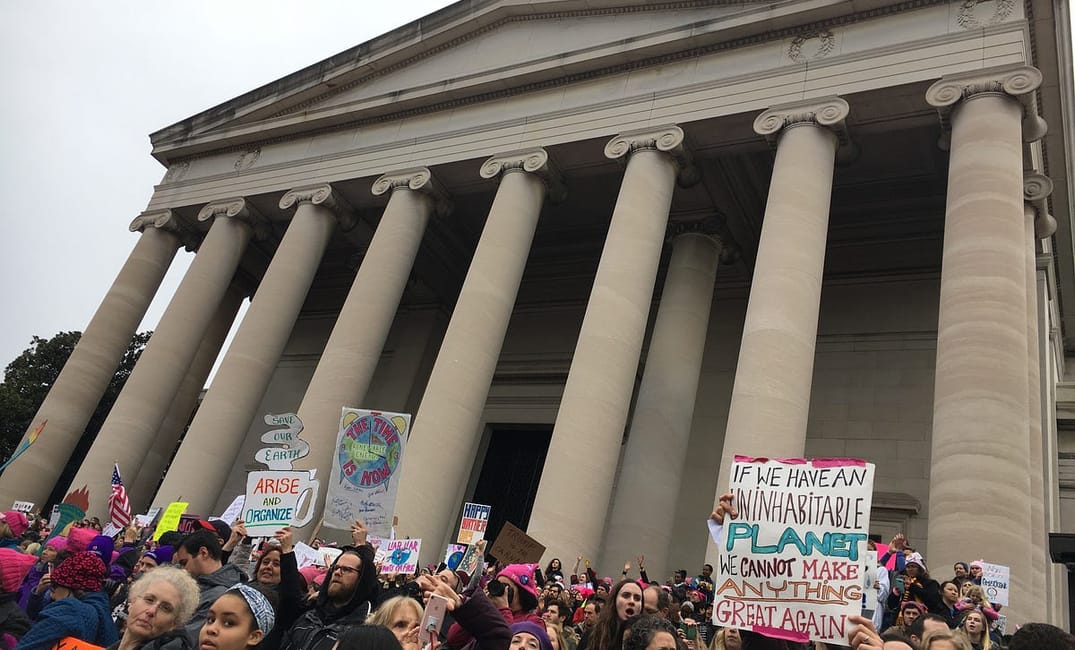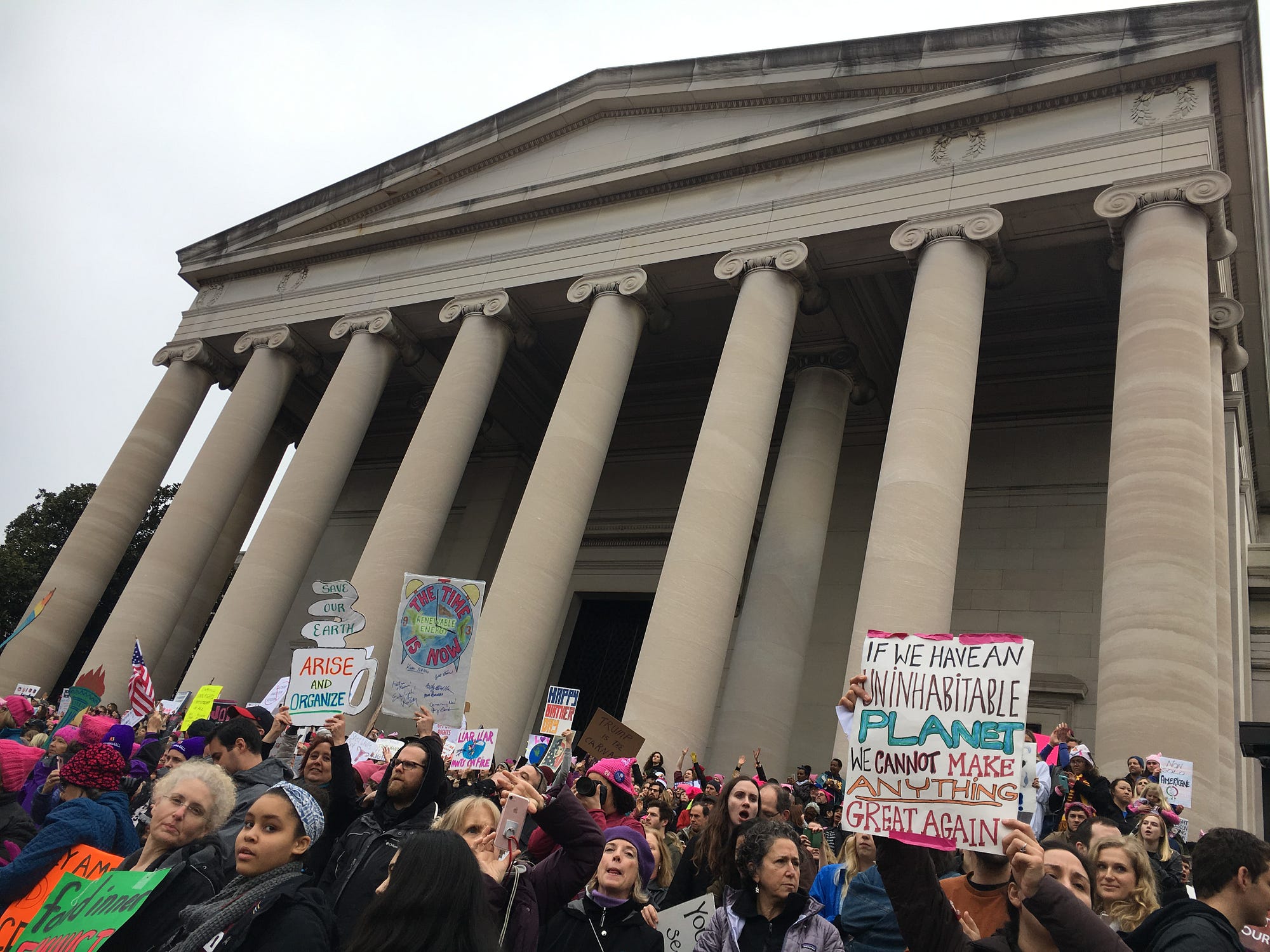
I don’t usually consider gas stations to be feminist spaces. They tend to be grimy; the fluorescent lighting is creepy; and the chance of catching a catcall is as likely as the tampon selection is bad.
This one, though — a Valero on Interstate 95, about 150 miles out of DC—was like a clubhouse for the sisterhood. Our group of Women’s March–bound travelers pulled in on late Friday night looking for coffee and gas, but what we found instead was solidarity. We had found the most feminist gas station in all of America.
Women were (prematurely) marching through the parking lot arm in arm; a snake-like formation of pink pajamas stretched from the bathroom out the front door; and every few minutes, a cheer broke out. The spirit of a hundred-plus pink-clad, not-giving-a-fuck ladies in a roadside rest stop sent a clear message to the few dazed men who’d stumbled in: beware, catcallers, this is our space now — just as the capital would be in a few hours.
Later that night, when inching through traffic, we caught sight of the Capitol building, and the mood became somber. I was getting anxious texts from relatives who had seen brick-throwing anarchists on CNN arguing with the group Bikers for Trump. It was slightly scary yet not serious enough to warrant our backing out now.
We parked the car a few blocks down from where we were crashing, next to a school whose parking lot was full of National Guard tanks. A truck with a National Guard logo mostly eclipsed a sign that read, “Dunbar High School — Happy New Year!” Was DC gearing up for a battle? These war machines were a dark counterpoint to the lively energy of the feminist gas station.
Eleven of us packed into a friend’s friend’s house that night. We slept on the floor amid the glitter detritus from a sign-making party held earlier that day. That glitter ended up being stuck in our hair during the rest of the trip— protester chic.
The next morning was a blur. We packed our signs and bags and walked toward the National Mall, though we could hear it before we saw it — a rolling chorus of a half-million voices, the kind of roar I thought existed only in gladiator movies. We had arrived.
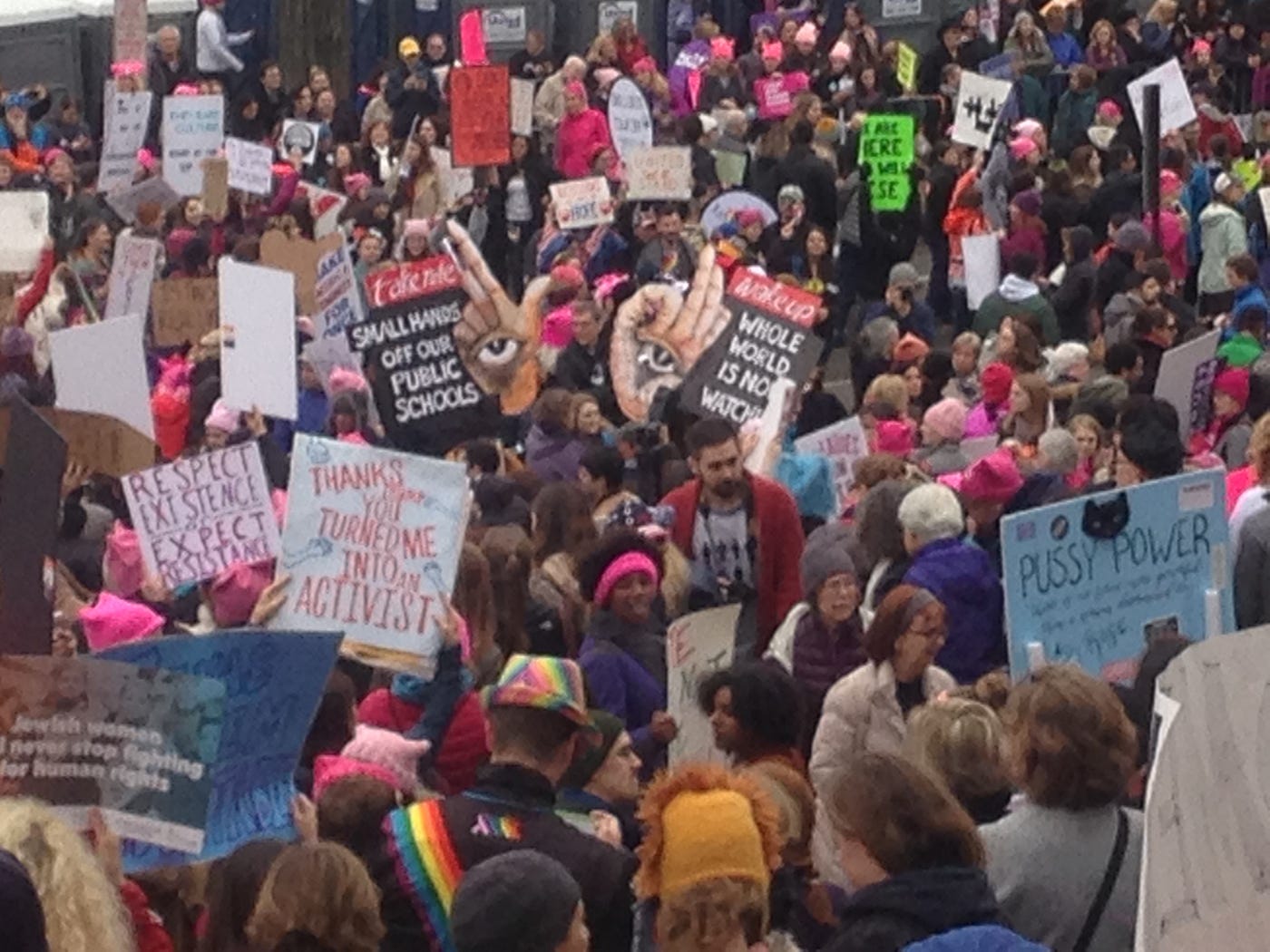
It seemed like every other woman had a baby on her back or a toddler in tow. Power in numbers. My group held onto each other’s hips as we moved through the crowd in order to stay together; as we moved, conga-line-like, I almost collided with a mother and her newborn, no more than a couple of weeks old. I could hear her translating the scene in baby talk to the unaware infact.
I’m confident that it will be our nation’s knack for sarcastic puns that pulls us through.
The crowd was so dense that we couldn’t see what was going on beyond the wall of signs. Yes, they were hilarious:
“I’m a Gay, Female, Latina Lawyer, and I’m Pissed.”
“We Need to Address the Elephant in the Womb.”
“Duderuses for Uteruses.”
(I’m confident that it will be our nation’s knack for sarcastic puns that pulls us through.)
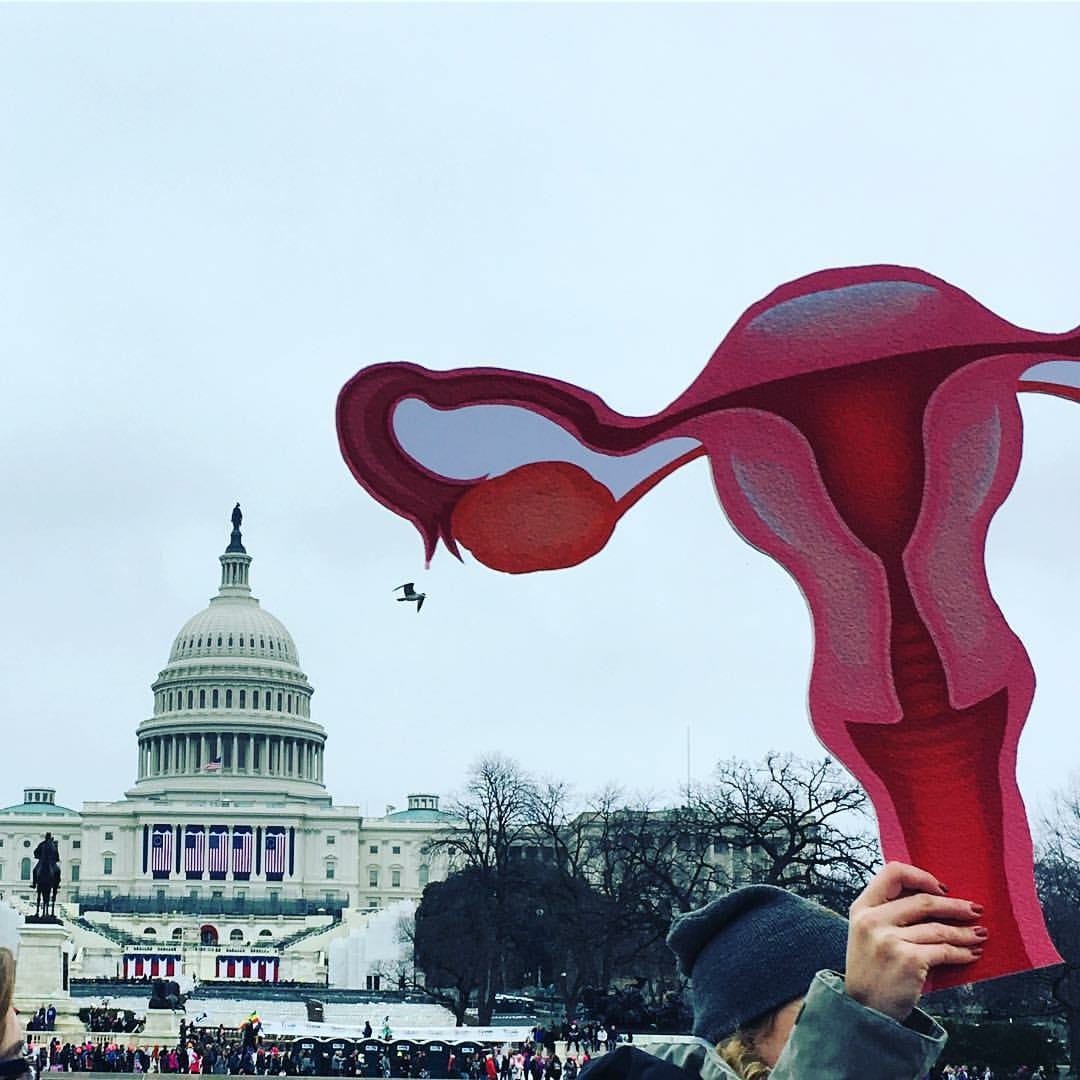
I could feel the vastness of the mall and the crowd around me but felt frustrated by my inability to see beyond the valley of signs around us. I worried we were shuffling in the wrong direction.
It was soon clear that in order to see what was going on at all, we would have to get to a higher elevation. One girl next to us had figured this out. Having scaled a scaffolding pole, she hung there from one arm like Gene Kelly on that streetlamp in Singing in the Rain, except that she was 30 feet off the ground. I admired her style—black leather jacket, black boots and long, curly red hair.
“I’m going to go see if I can get a better view,” I yelled back to my group, pointing at the scaffold a few hundred yards away, where the girl was dangling over the heads of who knows how many protesters. I made a mental note of all the trees and signs and tents between us so I could find my way back. “Don’t move. I’ll be quick.”
More agile alone, I weaseled my way through the crowd of raised arms and baby strollers until I found her. She had been pulled down by a news crew for an interview, and I pounced at the chance to talk to her too.
“Hey, what did you see up there? ”
“It’s incredible,” she said, her eyes looking over my shoulder into the crowd, like she was struggling to tally the crowd. “More people than I could even imagine.” She whipped out her iPhone and showed me a panorama she had taken. In her hand, she held the whole mall. Everything pink was our space.

She told me she was a chemistry major and how much climate change terrified her. I told her that I used to work for a sexual-violence crisis center.
“Where’s the stage?” I asked. “I want to see the speakers.”
“It’s over by the museums. Behind the Smithsonian. But I don’t think you’ll be able to get there. They have it blockaded.” My heart sank. She pointed me in the right direction and wished me good luck.
If you’ve never seen someone speak before 500,000 people, know that it is different from hearing a lecture. Beyond the spoken words, you get to feel the power of their voice resonate against the crowd’s energy.
I found my group again and told them. We decided to make a go for it, blockades and all. Moving as a group of 12 was a challenge, particularly given the distractions along the way: a band of long-haired Boomer women singing “This Little Light of Mine” while dancing around a Maypole was tempting. But we stopped for nothing. Good thing, too, as we made it just in time to hear Angela Davis come onstage.
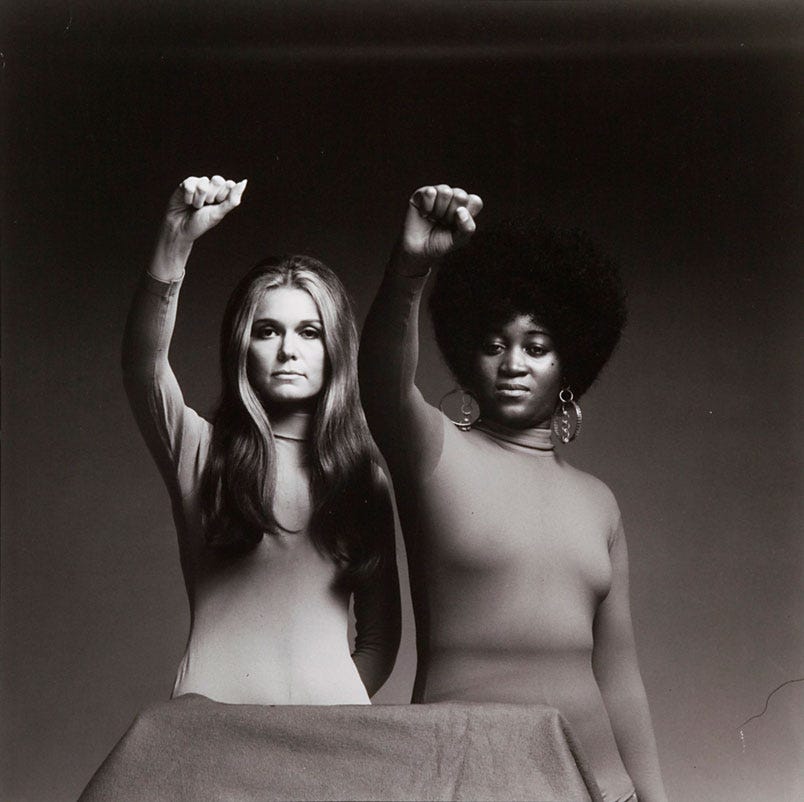
As Davis began speaking, someone waved their picket in the crowd below me. Pasted on it was a blow-up of the famous ’71 photo of Gloria Steinem and Dorothy Pitman Hughes, side by side with their fists raised in a show of resistance. It was a nod to the era that had made these women famous.
If you’ve never seen someone speak before 500,000 people, know that it is different from hearing a lecture. Beyond the spoken words, you get to feel the power of their voice resonate against the crowd’s energy. People were sitting on the roofs of porta potties just to hear what Angela Davis had to say. A teenager near me asked his girlfriend for a snack; she shushed him and turned her attention back to Davis.
Unlike what was suggested by the picture of her on the picket, Davis’s speech was not rooted in the past. “The next 1,459 days of the Trump administration will be 1,459 days of resistance,” she admonished.
“It’s not good enough to idolize activist icons of the past,” she told us. “No, it’s time to organize amongst ourselves, build new movements, develop new leaders, become collective agents of history.” Standing Rock, trans rights, and the water crisis of Flint, Michigan — she called us out on fights we stand to lose.
Everything from the pink-washed gas station to sleeping on the glitter-coated floors of strangers was part of my own personal engagement with democracy.
It struck me that what we were doing here — marching on the mall in protest of a sexist, racist, regressive president — was not just a reenactment of history but a movement to bring about a new age of activism, authentic in and of itself. Everything from the pink-washed gas station to sleeping on the glitter-coated floors of strangers was part of my own personal engagement with democracy.
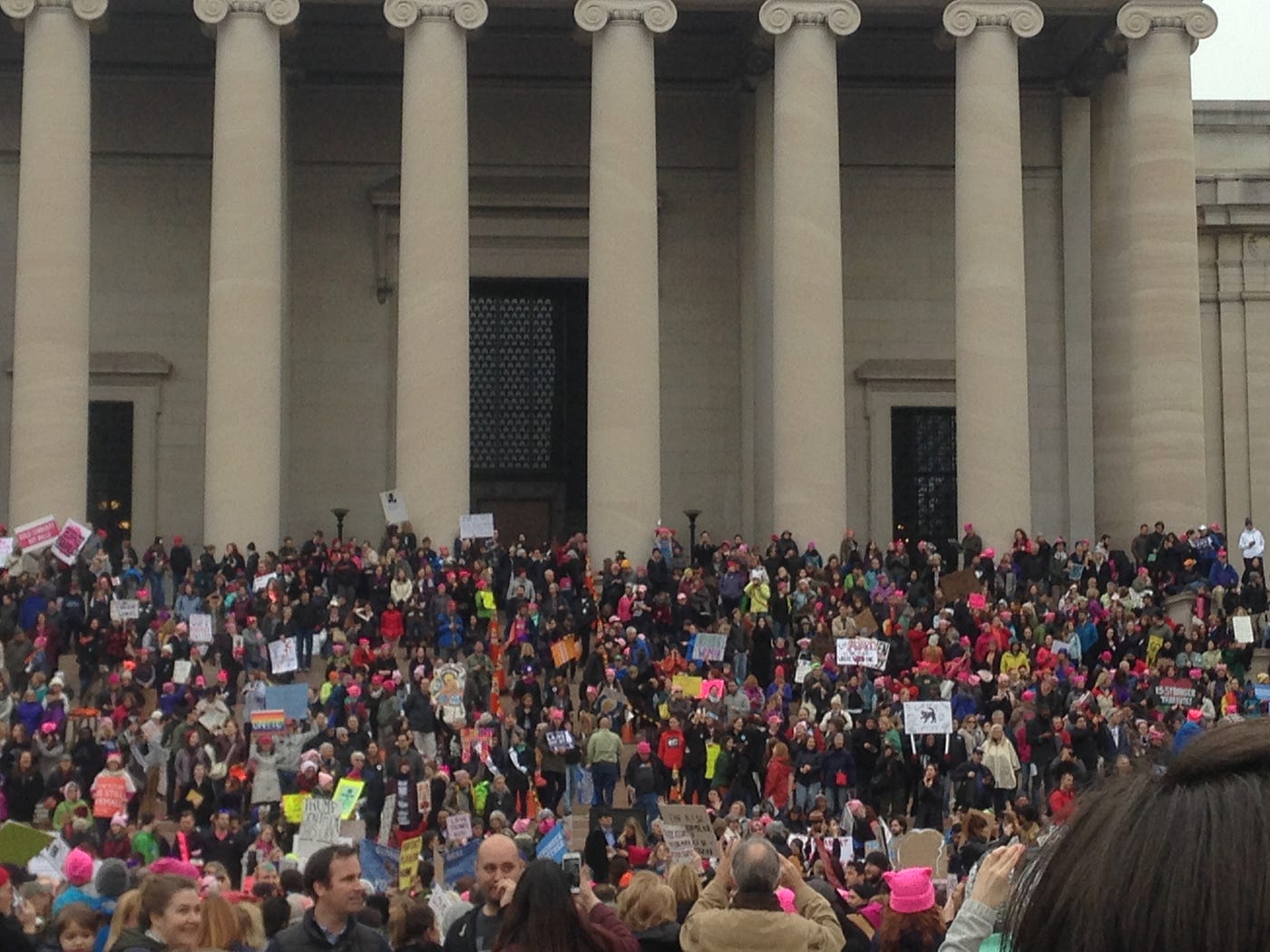
At the conclusion, the organizers roared, “Let’s march!” Instinctually, everyone in the crowd held hands and sprinted off. Feeling nearly blind to geography amid the mass of people, the locals directed us: “Stay straight!” Don’t go into the mall!” “Right on Constitution!” “No, I said right!”
Soon we didn’t need instructions; we could follow the sound of sirens. Police cars buzzed through the center of the crowd. We marched on, and their blares seemed to get louder. They were stepping up their attempts to disperse and intimidate. Were they frustrated by their lack of power? Were they emasculated by our perfectly legal, peaceful demonstration?
As we approached Trump’s International Hotel (who knew it was so close to the actual White House?), the sirens’ pitch reached a blaring high. We spat hisses, boos and collective chants of “Shame!” toward the hotel’s gaudy entrance. All the nation’s political tension, hidden under the positivity and motivation of the day, became vocalized on the doorstep of Trump’s business empire. Our curses blended together with the sirens around us.
What is it that we “bad” girls do so well? What are we good at? Besides the obvious, that is. Looking around, our success stretched up and down the avenue.
But in the end, we won. As we left the hotel behind, the sirens faded, overthrown. The rhythmic banter returned and resumed its wave-like call and response up and down Pennsylvania Avenue.
There were new chants: “We won’t go away. Welcome to your first day!”
And classic chants: “Si se puede! Si se puede!”
And all manner of chants strange, fierce and witty in between.
There was one chant I especially liked: “Bad girls do it well. Donald Trump can go to hell!” It was blunt; it was sexual; and it was contrarian yet feminine. But it also got me thinking, what is it that we “bad” girls do so well? What are we good at? Besides the obvious, that is. Looking around, one could see that our success stretched up and down the avenue.
We are good at organizing, first and foremost. We are good at speaking to our closest friends and to the masses. We are good at climbing, like the girl on the scaffold. We are good at making friends and welcoming them into our homes. We are good at making neon pins that read, “Crush the Phallic Imperialism.” (I was gifted one of these from a fellow marcher and will never remove it.) We are good at sticking together. We are good at looking out for one another. (Evidence: the sheer number of “Free Melania” signs being bandied about.) We are good at finding solidarity in unlikely places, like gas stations. We are good at making history. We are good at making Mr. Trump shake in his hair plugs and spew a stream of self-incriminating Twitter vomit. There’s really not much we “bad” girls can’t do well.
And so we “bad” girls finished the march and headed home, where we broke open some cheap wine and debriefed. I went to sleep on Saturday night on the floor on a makeshift bed of coats next to my friends, with the echo of “Bad girls do it well. Donald Trump can go to hell” filling my protester spirit with a renewed determination.



